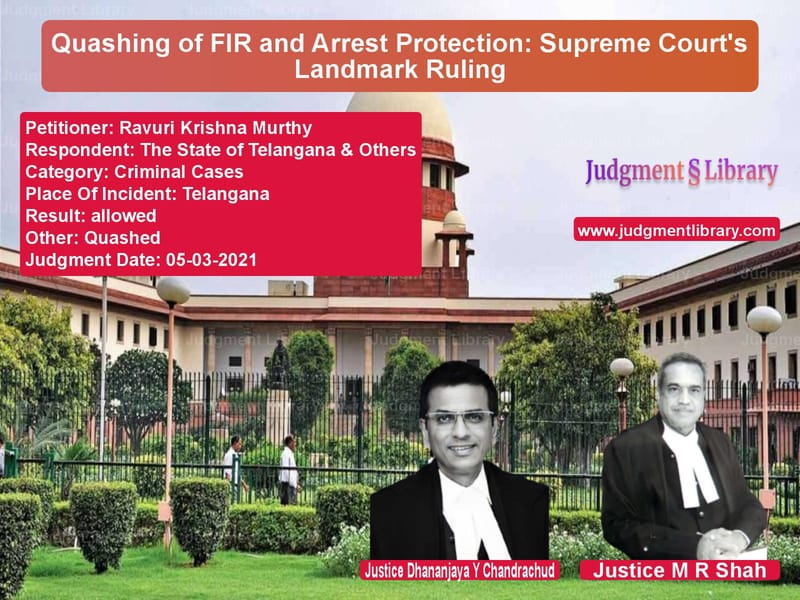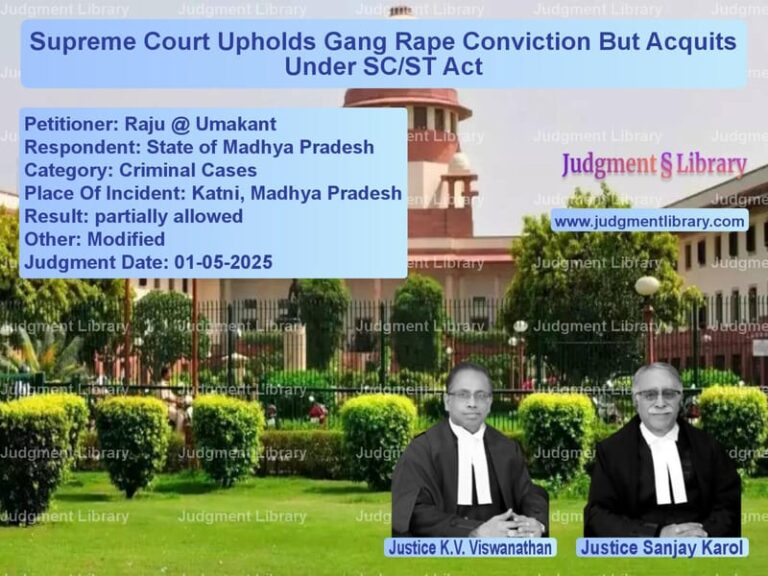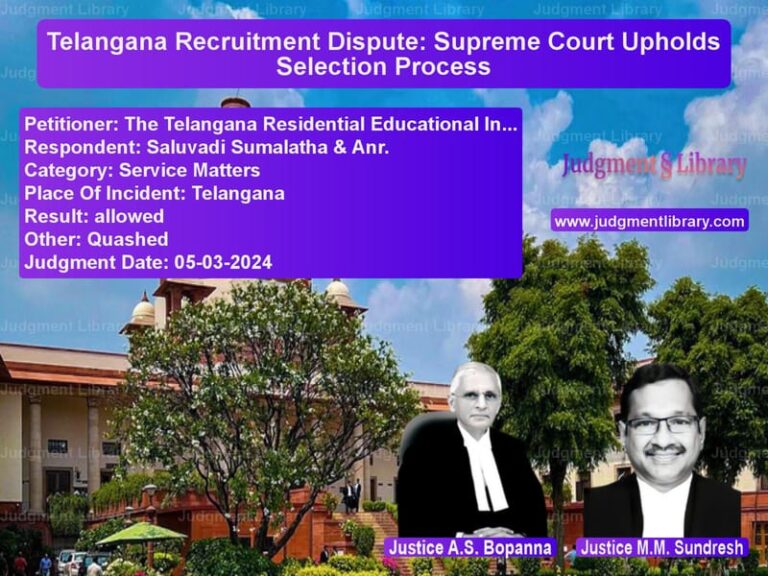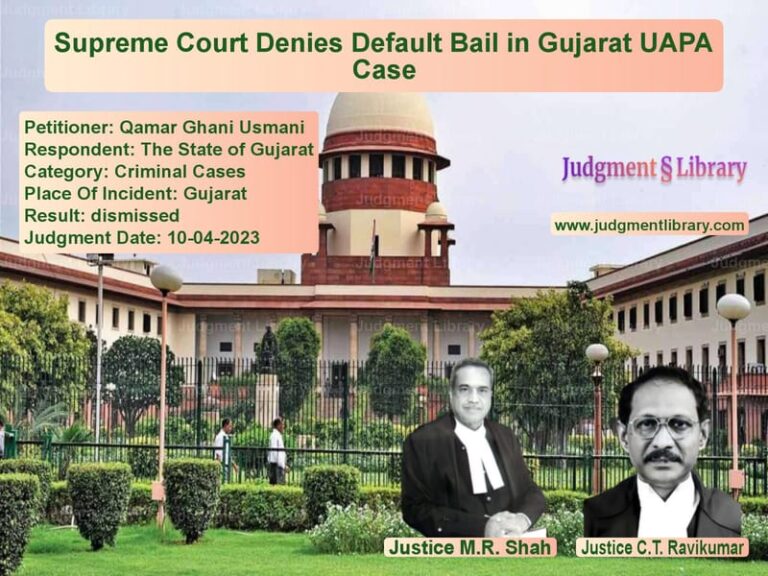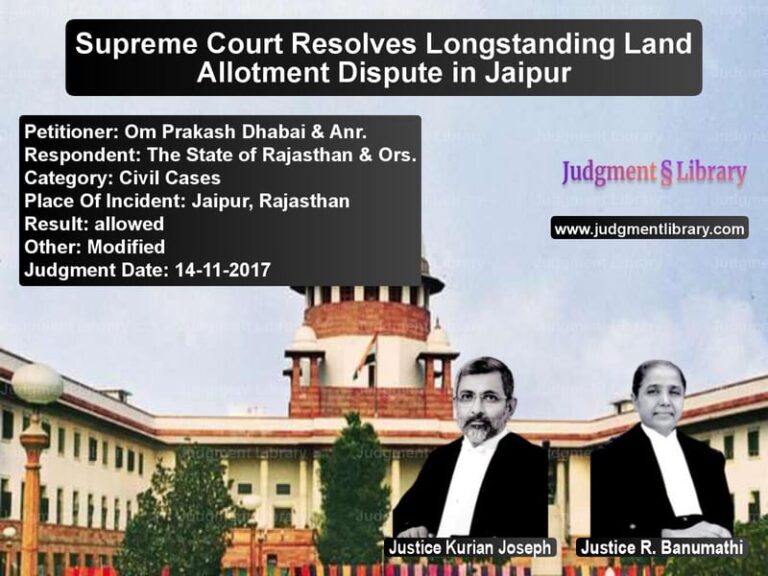Quashing of FIR and Arrest Protection: Supreme Court’s Landmark Ruling
The case of Ravuri Krishna Murthy vs. The State of Telangana & Others is a landmark judgment by the Supreme Court of India regarding the quashing of an FIR, judicial interference in investigations, and the issuance of blanket protection against arrest. The Court addressed whether a High Court, while declining to quash an FIR, could still issue an order preventing the arrest of the accused.
The Supreme Court set aside the High Court’s direction, reaffirming that criminal investigations should not be obstructed arbitrarily, and accused individuals have specific legal remedies available, such as anticipatory bail. The judgment is important in reinforcing the principle that police investigations must proceed without unnecessary judicial interference while ensuring that the rights of the accused remain protected under established legal provisions.
Background of the Case
The dispute began when a complaint was received by the police on March 29, 2016. The appellant, Ravuri Krishna Murthy, claimed ownership of a land parcel in Telangana and alleged that the second respondent, in collusion with his lawyer (third respondent), had fabricated a sale deed.
Read also: https://judgmentlibrary.com/supreme-court-upholds-conviction-in-haryana-dowry-death-case/
The allegations included:
- Fabrication of a sale deed dated November 30, 2005.
- Institution of a civil suit (OS No. 274/2014) before the Sub Divisional Magistrate using forged documents.
- Manipulation of court records to obtain an ex-parte judgment in favor of the second respondent.
- Filing of a Civil Revision Petition before the High Court to further the fraudulent claim.
- Forgery of judicial records to mislead courts.
The police, upon preliminary investigation, registered an FIR against the second and third respondents under various sections of the Indian Penal Code (IPC), including Sections 420 (Cheating), 468 (Forgery for the purpose of cheating), 471 (Using forged document as genuine), and 120B (Criminal conspiracy).
Legal Issues Raised
1. Whether the High Court Can Issue Arrest Protection While Dismissing Quashing Plea
The appellant challenged the High Court’s order granting blanket protection against arrest to the third respondent, even while declining to quash the FIR. The question raised was whether the High Court could prevent arrest when it had already determined that the allegations in the FIR warranted an investigation.
2. The Role of Investigative Authorities in Criminal Cases
The prosecution argued that police investigations should not be prematurely obstructed. They contended that the High Court’s order effectively prevented them from conducting a full investigation, despite strong prima facie evidence of forgery.
3. Application of Section 482 of the CrPC
The case raised concerns about the misuse of Section 482 of the Code of Criminal Procedure (CrPC) to shield accused persons from arrest. The respondent argued that the High Court had the power to pass necessary orders to prevent harassment and abuse of process.
Petitioner’s Arguments
The appellant’s counsel contended:
- The High Court could not grant blanket protection from arrest after refusing to quash the FIR.
- Such an order interfered with the due process of law and the power of investigating agencies.
- Respondents should have sought anticipatory bail rather than seeking blanket protection.
Respondent’s Arguments
The respondents countered with the following arguments:
- The FIR was registered maliciously with an ulterior motive.
- The High Court had the inherent power to protect individuals from unnecessary harassment.
- The allegations of forgery were unfounded and were being used to harass the accused.
Supreme Court’s Observations
The Supreme Court made the following key observations:
- The High Court correctly refused to quash the FIR but erred in granting blanket protection from arrest.
- The order restraining the police from arresting the accused lacked legal justification.
- Once the High Court found the allegations serious, it should not have impeded the police investigation.
- Individuals facing criminal charges have remedies such as anticipatory or regular bail, and courts should not interfere unnecessarily.
The Court relied on precedents, including The State of Telangana vs. Habib Abdullah Jeelani, where it was held that courts should avoid interfering in ongoing investigations unless there are compelling reasons.
Read also: https://judgmentlibrary.com/legal-battle-over-cheating-and-assault-allegations-a-case-analysis/
Final Verdict
The Supreme Court allowed the appeal and set aside the High Court’s direction restraining the arrest of the third respondent. The key directives were:
- The accused must apply for anticipatory or regular bail as per the law.
- The police investigation should continue without hindrance.
- The High Court’s interference in the investigation was unjustified and unsustainable.
- The blanket protection from arrest was revoked.
Implications of the Judgment
This ruling has significant implications for criminal law and judicial interventions:
- Reaffirming Investigative Autonomy: Police investigations should proceed without unwarranted judicial interference.
- Preventing Blanket Arrest Protection: High Courts should not issue orders that obstruct lawful investigations.
- Clarifying Remedies for Accused Persons: Those facing criminal charges must use statutory provisions for bail.
- Ensuring Judicial Restraint: Courts should balance fundamental rights with the need for effective law enforcement.
The judgment strengthens the principle that legal processes must be followed without undue interference, ensuring a fair investigation and protecting the rule of law.
Petitioner Name: Ravuri Krishna Murthy.Respondent Name: The State of Telangana & Others.Judgment By: Justice Dhananjaya Y Chandrachud, Justice M R Shah.Place Of Incident: Telangana.Judgment Date: 05-03-2021.
Don’t miss out on the full details! Download the complete judgment in PDF format below and gain valuable insights instantly!
Download Judgment: ravuri-krishna-murth-vs-the-state-of-telanga-supreme-court-of-india-judgment-dated-05-03-2021.pdf
Directly Download Judgment: Directly download this Judgment
See all petitions in Bail and Anticipatory Bail
See all petitions in Fraud and Forgery
See all petitions in Judgment by Dhananjaya Y Chandrachud
See all petitions in Judgment by Mukeshkumar Rasikbhai Shah
See all petitions in allowed
See all petitions in Quashed
See all petitions in supreme court of India judgments March 2021
See all petitions in 2021 judgments
See all posts in Criminal Cases Category
See all allowed petitions in Criminal Cases Category
See all Dismissed petitions in Criminal Cases Category
See all partially allowed petitions in Criminal Cases Category

